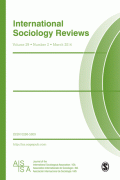
Abstract
This article presents an alternative account of comparative trajectories of secularization and religious change in Europe and America. Building on (1) ‘supply-side,’ (2) neo-orthodox secularization, and (3) historicist schools, the authors develop a synthetic explanatory framework which emphasizes changed conditions of religious belonging amid the transition to modernity. Modernization, they suggest, disrupted older, parochialized forms of religious community which emerged in the Middle Ages. The authors describe the rise and diffusion of newer, de-parochialized forms of religious belonging and organization in the 18th and 19th centuries and stress their comparative compatibility with modernity; here the authors draw special attention to the impact of missionary organizational schemas derived in colonial environments and re-purposed for domestic evangelism. They argue that mass unchurching was positively related to the persistence of parochialism and negatively related to the spread of post-parochialism. The salient comparison is therefore not merely between Western Europe and the US, but rather between national cases in which de-parochialization accompanied political and economic modernization and those in which it did not.